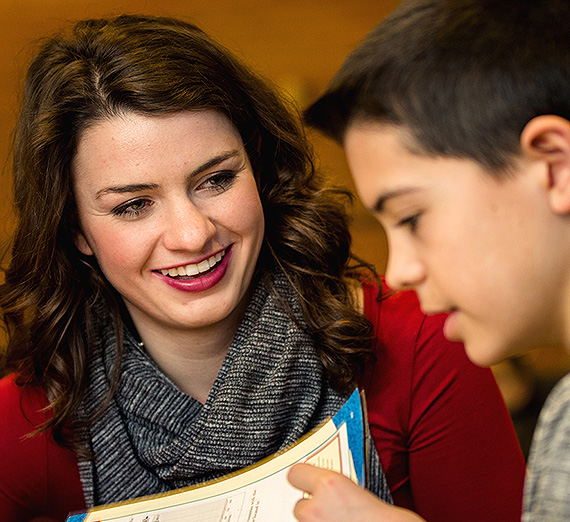Madison Rose Aims to Reform Education

By Taylor Hornney
Class of 2016
SPOKANE, Wash. – Gonzaga University senior Madison Rose knows all about adversity. In many ways, her struggles with multiple learning disabilities have formed who she is today: a national award-winning advocate for the learning disabled who aspires to someday become the U.S. Secretary of Education.
The special education major from Centennial, Colorado, who is earning an endorsement credential in reading and an elementary certification, was diagnosed with dyslexia, attention deficit hyperactivity disorder (known as ADHD), dysgraphia (a condition that causes difficulty with written expressions), and short-term memory deficit. In addition, she has slow processing speed, which contributes to learning and attention difficulties.
While her short-term goal is to help as many young people with learning disabilities as possible through teaching, Rose’s struggles with learning have inspired her long-term dream to bring systemic change to American education.
“I need to be changing policies, figuring out ways to make our school systems work, and making sure things are just for everyone,” said Rose, who was honored last week as a Campus Compact 2016 Newman Civic Fellow. She is among 218 student leaders from colleges and universities in 36 states, Washington, D.C., and Mexico so honored this year.
Rose is a student coordinator for the Eye to Eye mentoring program, a national initiative that creates awareness about learning differences and ADHD. She worked with fellow Gonzaga students to host a Share Your Story event on campus March 15. As a student at Regis Jesuit High School in Aurora, Colorado, Rose presented a TedxYouth talk describing her challenges with learning disabilities.
Rose knew she was different as a first-grader. While she was able to understand spoken material in class, there became a clear disconnect with her reading and written work. She remembers being held in for recess almost every day to get extra help, and falling behind her classmates in classroom competitions. Whatever help she was offered simply did not work.
Her first success came in seventh grade when one of her teachers called her in after class and quizzed her orally. Rose received a score of 97 percent on the test. As it turned out, she had an in-depth understanding of her classwork, but could not translate that knowledge to paper. For the rest of the school year, Rose took her tests orally and improved her grade from barely passing to an A-plus.
It was the first time someone had asked me, ‘Why isn’t this connecting? What is happening?’” says Rose. “I remember sitting there with my mom and I just started crying, she (the teacher) started crying, my mom started crying, and it was this intense moment where someone recognized in me that I deserved more.”
Discovering that she was highly intelligent and capable of excelling in school changed everything for Rose.
From that first accommodation, Rose has had no problem asking for help. Rose’s learning disabilities have taught her profound lessons in perseverance and grit.
Rose says she loves to fail, because it means she gets to learn. She loves ideas, because they’re messy and need work. Most of all, she loves to soar beyond others’ expectations and looks forward to helping many others do the same.
“There’s a statistic that says if life were decided by a third-grade reading assessment, then there would be a prison bed out there with my name on it. But I beat those odds,” she said. “It’s time we start understanding people with learning disabilities by asking questions and having productive conversations. That’s how we’re actually going to change things.”
